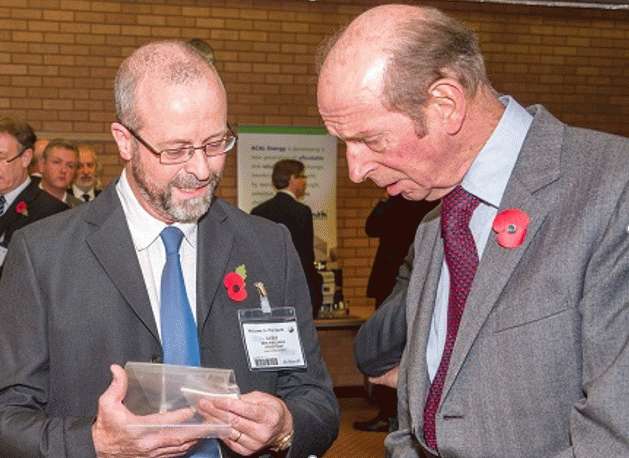Innovate UK for revolutionary artificial blood research
SpheriTech, a leading life science company based at The Heath Business and Technical Park in Runcorn, has been awarded a grant from innovation agency Innovate UK to help fund a £100k pioneering research project to develop artificial blood.
SpheriTech’s synthetic blood, SpheriSome® Hb, could revolutionise the treatment of trauma patients. Each year more than three million transfusions take place in the UK with the NHS Blood Transfusion Service collecting 1.7 million litres of blood in England and Wales which is given to around 500,000 patients.
Dr Don Wellings, the founder and managing director of SpheriTech, (pictured left at a function with the Duke of Kent), says: “The use of donated blood in transfusion therapy, while effective in restoring an adequate supply of oxygen in the body of the recipient, has several limitations. Although testing procedures exist to detect the presence of certain diseases in blood, these procedures cannot eliminate completely the risk of blood-borne disease.
“Moreover transfused blood can be used only in recipients having a blood type compatible with that of the donor. Delays in treatment, resulting from the necessity of blood typing prior to transfusion, together with the limited shelf life of blood and the limited availability of certain blood types, impose constraints on the immediate availability of compatible blood for transfusion in an emergency setting. Yet, despite numerous attempts to come up with viable synthetic blood substitutes since the 1980s, there is still not a single synthetic blood substitute currently available for human trauma patients in the US and Europe.”
Now SpheriTech has invented and is developing a novel blood substitute, a Haemoglobin-based oxygen carrier (HBOC), which will be intravenously administered to deliver oxygen to the body’s tissues. Oxygen deprivation, even for several minutes, will result in cell damage, organ dysfunction and, if prolonged, death. Problems that occur due to oxygen deprivation are generally classified into three categories:
• Anaemia — a decrease in the concentration of red blood cells in the circulation. Anaemia occurs due to blood loss, for example, in case of injury or surgery, but other disorders may provoke it too.
• Cardiopulmonary failure - impaired function of the heart or lungs. When the heart is unable to pump sufficient quantities of blood to meet oxygen needs of the tissues, the tissue can become severely damaged.
• Ischemia — a decrease or lack of red blood cell flow to an organ. Ischemia happens due to obstructed blood vessels (during a heart attack, stroke, trauma or even some medical procedures).
Dr Wellings says: “The first two problems are often tackled with a red blood cell transfusion, especially in anaemia resulting from blood loss. Currently there are two sources of red blood cell used for transfusions — donated blood or recipient’s own pre-donated blood. However, blood typing and handling procedures as well as specific storage requirements, limit the feasibility of using donated blood in many cases. These limitations become especially aggravated in out-of-hospital emergency situations such as in battlefields, areas struck by natural disasters, terrorist attacks, and other accidents.
“In some developed countries, decreasing numbers of new volunteers giving blood has resulted in a shortage of blood for day-to-day operations while in developing countries access to safe blood supply for transfusions is a constant struggle, due to infectious agents and lack of stringent screening. According to the World Health Organisation, 82% of the world’s population does not have access to safe blood. Therefore, with an aging population and consequently an increase demand for blood products, finding alternative blood supplies to meet the need is vital.”
SpheriTech has embarked on a challenge that has hindered the previous generation of HBOCs, and the company is now confident that its ground-breaking next generation blood substitute will revolutionise blood transfusions — providing cost effective, scalable and safe artificial blood to the patients where traditional blood transfusions are not ideal or possible.
While SpheriTech’s HBOC blood substitute mimics fundamental oxygen carrying features of natural blood, it has certain advantages over red blood cells (RBCs).
• Easy access trouble-free storage condition: Extended shelf-life is one of the major advantages of SpheriTech’s synthetic blood substitute over regular blood. Consequentially, SpheriTech’s product can be stored at room temperature and stocked well in advance of anticipated use. Therefore, it can provide immediate relief to patients in case of an accident by providing temporary oxygen carrying support until suitable quantity of red blood cells can be transfused or generated.
• Blood typing free: Unlike RBCs which require cross-matching and blood typing before transfusion, SpheriSome® Hb does not discriminate between blood types and can be universally accepted, even for rare blood group types.
• Contaminants and infectious agents-free: Unlike donated blood, which undergo stringent testing to detect contaminant and microorganisms, SpheriTech’s product is free of disease transmission and can be sterilized by heat or UV.
• Efficient at transporting oxygen and release oxygen where needed: The stabilized haemoglobin molecules in SpheriSome® Hb can hold the same amount of oxygen as the haemoglobin molecules in red blood cells, on a gram-for-gram basis, and will be designed to release oxygen in the same way as red blood cells.
Dr Wellings says SpheriSome® Hb also has the ability to be fully excreted from the body and not accumulate in various tissues, and is non-toxic, non-immunogenic, non-antigenic and non-carcinogenic.
About SpheriTech
SpheriTech Ltd. is a UK based independent research, development, and manufacturing company focused on developing novel and innovative polymeric materials, which offer wide-ranging application solutions to clients within the life science research, biotechnology, and healthcare industries.
The company was founded by Dr Donald A. Wellings, who is an internationally recognised authority on peptide synthesis, polymer design, and chromatography with over 30 years’ experience of working in major organisations having held senior scientific posts in ICI, Zeneca, Avecia, and Polymer Laboratories. For further information contact Dr Don Wellings at don.wellings@spheritech.com
About Innovate UK:
Innovate UK is the United Kingdom’s innovation agency. It drives productivity and growth by supporting businesses to realise the potential of new technologies, develop ideas and make them a commercial success. With a strong business focus, Innovate UK drives growth by working with companies to de-risk, enable and support innovation. To do this, it works to:
• determine which science and technology developments will drive future economic growth
• meet UK innovators with great ideas in the fields Innovate UK is focused on
• fund the strongest opportunities
• connect innovators with the right partners they need to succeed
• help the UK’s innovators launch, build and grow successful businesses
Since 2007 Innovate UK has committed over £1.8 billion to innovation, matched by a similar amount in partner and business funding. It has helped 8,000 organisations with projects estimated to add more than £16 billion to the UK economy and create nearly 70,000 jobs.
About The Heath
The Heath Business and Technical Park is a phenomenal regeneration success story. Formed in 2000, its owner and operator, SOG Ltd, has transformed a once single occupancy corporate facility into a thriving independent business park. The Heath now provides office and laboratory accommodation for more than 120 individual organisations, ranging from business services and IT specialists to those at the cutting edge of science, research and advanced manufacturing. Around 2,000 people are employed at the site. For further information, telephone 01928 515988 or visit www.theheath.com
For more information, please see:
www.theheath.com
PAUL SMITH ASSOCIATES
21st November 2017

Editors please contact PSA for high res version of this and other photos for use with this news story.
